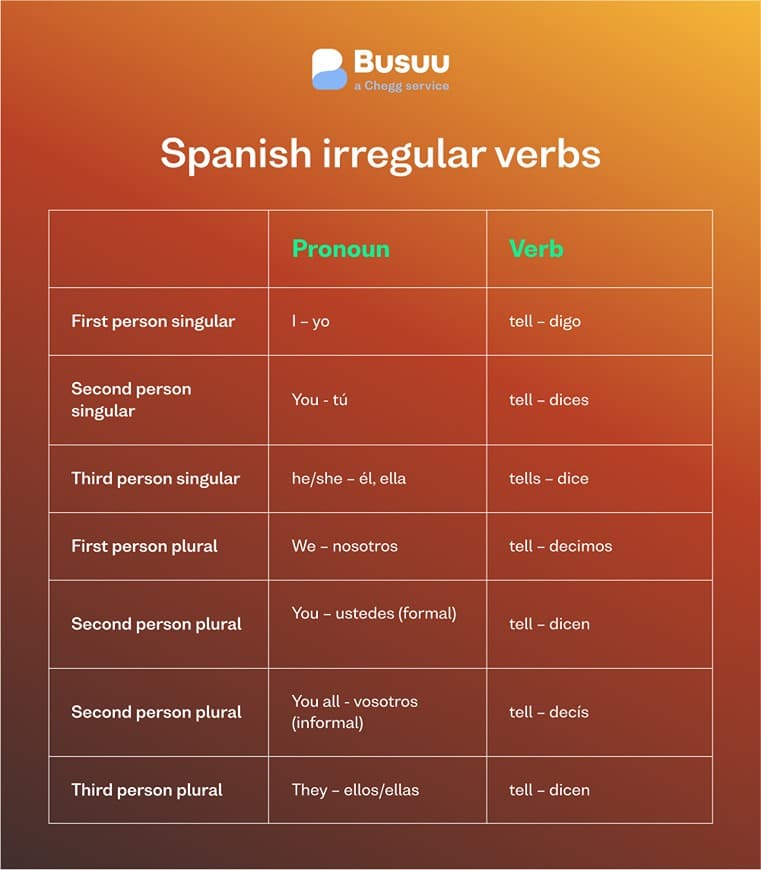I want to learn...
Did you know there are hundreds of irregular Spanish verbs?
Verb conjugations can be tricky, especially when they don’t follow a standard pattern, which is the case with irregular verbs in Spanish.
In this guide, we’ll explain what the Spanish irregular verbs are and give you a list of 50 that are worth remembering, to help you express yourself in Spanish, and improve your spoken language skills.
What are irregular Spanish verbs?
Irregular Spanish verbs don’t follow a regular Spanish verb conjugation.
Let's think about the English verb “to tell”. In the present tense, you simply write a pronoun before the verb. The only exception is the third-person singular form that has an “s” at the end.
But in Spanish verb conjugation, this happens differently as decir (to tell) is an irregular verb.

Irregular verb
| Pronoun | Verb | |
|---|---|---|
| First person singular | I – yo | tell – digo |
| Second person singular | You - tú | tell – dices |
| Third person singular | he/she/it – él, ella | tells – dice |
| First person plural | We – nosotros | tell – decimos |
| Second person plural | You – ustedes | tell – dicen |
| Third person plural | They – ellos/ellas | tell – dicen |
Irregular Spanish verbs don’t respect the stem of the infinitive and, in some verbs, amar (to love), temer (to fear) and partir (to leave), they don’t take the endings either. Irregular Spanish verbs can show differences in the stem, the ending or in both elements of the word, when they’re conjugated in verb tenses.
How does this work?
Let’s conjugate the irregular verb amar (to love) and compare it to the example verb jugar (to play) in the third person singular of the simple past perfect indicative mood (perfect preterite simple). The stem of the verb is in bold.
Irregular vs. regular verb conjugation
| Example verb | Irregular verb | |
|---|---|---|
| Verb in infinitive | amar | jugar |
| Él/ella (he/she) | amó | juego |
As you can see, the stem of the verb jugar has changed. This is a stem-changing verb from “u” to “ue.”
But irregular Spanish verbs don’t necessarily change in all tenses and moods.
How many irregular verbs are there in Spanish?
There are more than 250 irregular verbs in Spanish, but they vary in the intensity of their irregularity.
To start with, there are different types of irregularities. Let's take a look at some examples:
Stem changing verbs
Stem changing verb from “u” to “ue”
To fit - caber: yo quepo, tú cabes, él cabe
Stem changing from “e” to “ie”
To understand - entender: yo entiendo, tú entiendes, él entiende
Stem changing from “o” to “ue” and “hue”
To eat lunch - almorzar: yo almuerzo, tú almuerzas, él almuerza
To smell - oler: you huelo, tú hueles, él huele
Note: an “h” in Spanish is always silent so it doesn't have any effect on
Stem changing from “e” to “i”
To say/to tell - decir: yo digo, tú dices, él dice
Spanish verbs with an irregular “yo” form with no stem change
To fit - caber: yo quepo, tú cabes, él cabe
Spanish verbs with an irregular “yo” form with a stem change
To say/to tell - decir: yo digo, tú dices, él dice
50 irregular Spanish verbs you need to know
Spanish irregular verbs list
Acertar – to get it right
Adquirir – to acquire
Advertir – to advise, warn
Agradecer – to thank
Almorzar – to eat lunch
Andar – to walk, have (existence),
Asir – to seize
Atender – to attend to
Caber – to fit
Caer – to fall
Ceñir – to surround
Comenzar – to begin, start
Conducir – to drive
Construir – to build
Contar – to count, relate, tell
Dar – to give
Decir – to tell, say
Discernir – to discern, understand
Dormir – to sleep
Encontrar – to find
Entender – to understand
Erguir – to build, sit or stand up very straight
Errar – to miss
Estar – to be (location, health, state)
Haber – to have (to do something, auxiliary verb)
Hacer – to do, make
Ir – to go
Jugar – to play
Leer – to read
Lucir – to shine
Mover – to move
Oír – to hear
Oler – to smell (to smell an object, to emit an odour)
Pedir – to ask
Poder – to be able, can
Poner – to put
Pudrir / Podrir – to rotten
Querer – to want
Roer – to gnaw, bite, chew repeatedly
Saber – to know (information)
Salir – to leave, go out
Sentir – to feel, regret
Ser – to be (permanent quality)
Sonreír – to smile
Tener – to have
Traer – to bring
Valer – be worth
Venir – to come
Ver – to see
Yacer – to lay down
Ready to learn more irregular verbs in Spanish?
Now you know irregular verbs like “vinimos” which is the preterite (past simple) tense form of the verb "venir," which means "to come, you can start putting them into practice to better express yourself via Busuu’s free online Spanish courses and learning resources!
Irregular verb conjugation and irregular preterite verbs
Here’s a list of Spanish irregular verb conjugation and irregular preterite verbs.
The pronoun ustedes is used in Latin America, compared to Spain where vosotros is used.
1. Decir – to tell
Present tense:
Yo digo – I tell
Tú dices (vos decís)– you tell
Él/ella/usted dice – he/she tells
Nosotros decimos – we tell
Vosotros decís – you (pl.) tell
Ellos/ellas/ustedes dicen – they tell
Simple past tense (decir preterite):yo dije - I told
2. Ir – to go
Present tense:
Yo voy – I go
Tú/vos vas – you go
Él/ella/usted va – he/she goes
Nosotros vamos – we go
Vosotros vais – you (pl.) go
Ellos/ellas/ustedes van – they go
Simple past tense (ir preterite):yo fui - I went
3. Oler – to smell
Present tense:
Yo huelo – I smell
Tú hueles (vos olés) – you smell
Él/ella/usted huele – he/she smells
Nosotros olemos – we smell
Vosotros oléis – you (pl.) smell
Ellos/ellas/ustedes huelen – they smell
Simple past tense (oler preterite): yo olí - I smelled
4. Poner – to put
Present tense:
Yo pongo – I put
Tú pones (vos ponés) – you put
Él/ella/usted pone – he/she puts
Nosotros ponemos – we put
Vosotros ponéis – you (pl.) put
Ellos/ellas/ustedes ponen – they put
Simple past tense (poner preterite): yo puse - I put
5. Ser – to be
Present tense:
Yo soy – I am
Tú eres (vos sos) – you are
Él/ella/usted es – he/she is
Nosotros somos – we are
Vosotros sóis – you (pl.) are
Ellos/ellas/ustedes son – they are
Simple past tense (ser preterite): yo fui - I was
We highly recommend you to learn these conjugations by heart since the verb “to be” is constantly used in Spanish conversations, reading and writing.
This verb is used to tell the time in Spanish.
Es la una de la tarde. (It´s one in the afternoon)
Son las siete de la mañana. (It 's seven in the morning).
6. Tener – to have
Present tense:
Yo tengo – I have
Tú tienes (vos tenés) – you have
Él/ella/usted tiene – he/she has
Nosotros tenemos – we have
Vosotros tenéis – you (pl.) have
Ellos/ellas/ustedes tienen – they have
Simple past tense (tener preterite): yo tuve - I had
7. Venir – to come
Present tense:
Yo vengo – I come
Tú vienes (vos venís) – you come
Él/ella/usted viene – he/she comes
Nosotros venimos – we come
Vosotros venís – you (pl.) come
Ellos/ellas/ustedes vienen – they come
Simple past tense (venir preterite): yo vine - I came
These 50 irregular Spanish verbs are just the beginning, there’s so much more to learn with Busuu
Busuu online language courses help you learn everyday language skills you’ll actually use. We have language courses for all learners, from complete beginners, to experienced linguists, all hosted on our interactive platform. Our clever revision technology helps your learning stick, and you’ll get helpful feedback and support from the global Busuu Community.
Newlanguages


